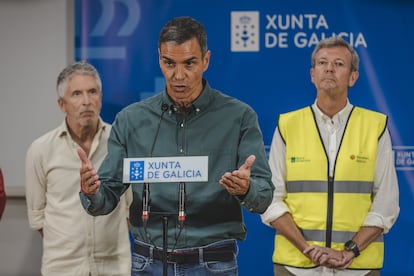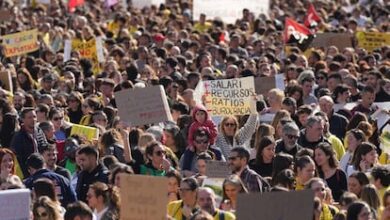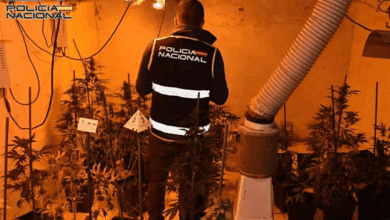
Wildfires continue to rage across Spain, engulfing large areas of Galicia, Castilla y León, and Extremadura for several consecutive days. Despite the challenging situation, political tensions eased last Sunday as representatives of the central and regional governments joined forces to combat the flames.
Prime Minister Pedro Sánchez personally visited the worst-affected areas, where fires have destroyed homes, farms, businesses, and unique natural sites. To support local services, he ordered the deployment of 500 army personnel and allocated all necessary resources for relief efforts. Special attention was given to the province of Ourense (Ourense), where, at the request of Galicia’s president Alfonso Rueda, 200 troops will be mobilized to build firebreaks and undertake other urgent tasks.
Sánchez and Rueda visited the fire coordination center in Ourense together, highlighting the importance of unified action among all levels of government. Both leaders stressed the need for close cooperation and rapid on-the-ground coordination to respond as effectively as possible to the spread of the fires.
Authorities have promised to speed up assistance to residents affected by the fires as soon as the situation stabilizes. In addition, the Prime Minister announced plans to initiate a new nationwide climate agreement, so that the country can better respond to such emergencies in the future. Discussions on the details of this agreement are expected to begin in September.
The head of Galicia also noted that climate change requires additional measures to minimize the risks and consequences of natural disasters. According to him, only coordinated efforts by all agencies will effectively protect the population and the region’s economy.
At present, about a dozen major fire outbreaks remain active in Galicia, all concentrated in the province of Ourense. The flames threaten residential homes, and in some communities, isolation measures have been imposed due to deteriorating air quality. However, meteorologists predict a drop in temperature and weakening winds, which may ease firefighting efforts and provide a chance to stabilize the situation in the coming days.
Since taking office, Sánchez has repeatedly faced major crises—from the pandemic to a volcanic eruption and energy disruptions. Now, the authorities hope that this year’s wildfire season will become a turning point in Spain’s approach to managing climate risks. Officials emphasize that the country needs to reassess its strategies and strengthen preparedness for increasingly frequent and devastating natural disasters.
In the near future, the main focus will be on extinguishing the fires and supporting those affected. Afterward, work will begin on a new pact aimed at strengthening Spain’s position in tackling the consequences of climate change.












